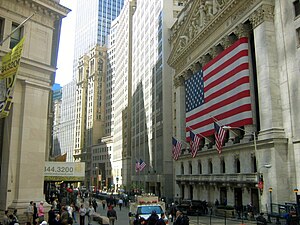| The New York Stock Exchange, the world's largest stock exchange by market capitalization (Photo credit: Wikipedia) |
The decision to close the New York Stock Exchange NYX +0.32% and other U.S. equity markets for a second straight day—reached by midafternoon Monday—renewed questions about the industry's disaster preparedness. And it underlined the indispensable role humans still play in a market dominated by machines. Bond market operators decided to shutter their markets on Tuesday, too.
Investors could see markets turn more volatile should they reopen on Wednesday, with pent-up demand driven by Sandy, which was relabeled a posttropical storm on Monday evening, and traders scrambling to reposition holdings ahead of Friday's employment report and next week's election.
"You're compacting two major events, one—the most important event of the year—the election, and two, an employment number that a lot of people are looking at," said Andrew Brenner, head of international fixed income at National Alliance Securities. He added: "You're running the risk of some major asset price changes and very illiquid trading over the next week. People who want to get in or get out, they're not going to be able to get in and out."
Latest Updates on Sandy
Get real-time updates on flooding, forecasts, closures and more as Sandy closes in on the U.S. East Coast. Go to the Live Stream. .
Potential damage wrought by Sandy drove European and Asian stocks lower Monday as some investors exited energy and insurance stocks. "European markets are looking for direction in the absence of Wall Street being there to provide it," said Richard Hunter, head of equities at Hargreaves Lansdown PLC.HL.LN -4.15%
Exchange customers, led by large banks and brokers, spent Sunday night fighting to reverse an earlier plan by the NYSE to open its all-electronic trading venue on Monday despite the hurricane. While stock trading is now often driven by complex trading programs devoid of human judgment, customers and regulators argued, the markets still need humans to function.
"You still have to have human beings who monitor those systems, and you still have to have a human being manage the initial part of that order flow, and to manage the back end of that," said Michael Shea, managing partner at Direct Access Partners, an institutional brokerage based in lower Manhattan.... Continue to read.
![[image]](http://si.wsj.net/public/resources/images/OB-VD195_sandy1_A_20121027152942.jpg)

No comments:
Post a Comment